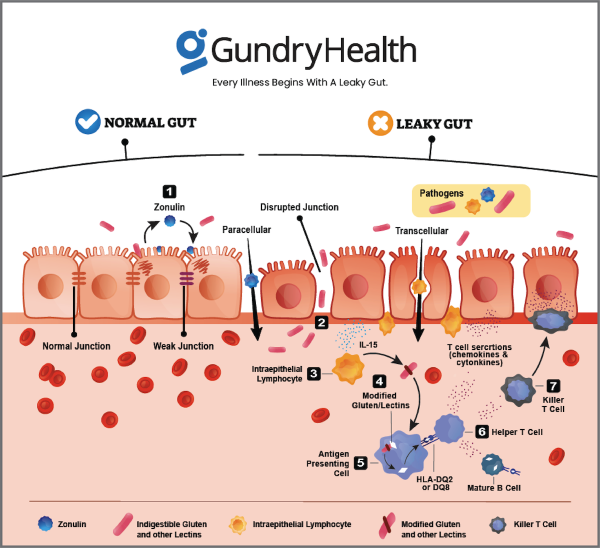Dr. Steven Gundry Explains: The Best Way to Treat Rheumatoid Arthritis
Find out what rheumatoid arthritis is, why it occurs, whether you may have it, and the step-by-step plan to reduce and eliminate symptoms.
“She couldn’t even hold her baby” — how rheumatoid arthritis can affect your life
After delivering her first child, 27 year-old Suzanna K. developed devastating rheumatoid arthritis. And the drugs she’d been put on to reduce the pain made it too dangerous for Suzanna and her husband to consider getting pregnant again.
Making Hard, Easy.
Rheumatoid arthritis (RA) affects millions of people by causing the immune system to attack the lining around the joints and muscles. This can cause extreme pain and swelling in the joints. Not only that, but rheumatoid arthritis can lead to loss of joint function, fatigue, weakness, and more.
In the case of Suzanna K., even after she started taking steroids and an immunosuppressant drug she still had extremely swollen joints. In fact, moving around was so painful that she couldn’t even hold her baby child without severe pain.
Stories like Suzanna’s are incredibly common. Nearly 1.5 million Americans are suffering from rheumatoid arthritis, with women 3 times more likely than men to get this autoimmune disease.
And rheumatoid arthritis can have a devastating effect on your ability to live life on your terms. It can make healthy activities like playing sports, hiking or jogging, and lifting weights painful and difficult. Worse, it can make even simple movements (like holding a child or driving a car) almost impossible to perform without pain.
Despite there being no known cause or cure for rheumatoid arthritis, renowned heart surgeon and functional medicine practitioner Dr. Steven Gundry has had remarkable success curing his own patients of the autoimmune disease.
The medical mystery that stumped Dr. Gundry
Not long after he opened his first private practice, The Center for Restorative Medicine in Palm Springs, California, Dr. Gundry noticed a striking pattern in many of his female patients.
A shocking number of them suffered from low thyroid (most due to Hashimoto’s thyroiditis ), and many of those patients also suffered from arthritis. To help relieve their constant pain, these patients typically took one or more over-the-counter painkillers called NSAIDs (that stands for non-steroidal anti-inflammatory drug).
Soon, Dr. Gundry noticed other things they had in common, like certain prescription drugs or dietary patterns. More remarkably, many of these female patients were thin and ate foods most people would consider healthy, like whole wheat grains, egg white omelets, and salads with dressing on the side.
At first, Dr. Gundry was stumped. He knew there had to be some connection between the medications and diets. But what?
Rheumatoid Arthritis Symptoms
To understand Dr. Gundry’s breakthrough, we need to talk more about autoimmune diseases like rheumatoid arthritis. An autoimmune disease is simply a condition where your immune system mistakenly attacks your body.
Normally, your immune system acts as your body’s natural defense system, protecting it against germs, bacteria, and other invaders. However, with an autoimmune disease, your immune system can no longer tell the difference between a harmful invader and your body’s own cells.
Rheumatoid arthritis, for example, causes your immune system to attack the cells on the lining of your joints. This is what causes the painful soreness and swelling most people associate with rheumatoid arthritis.
Daily Habits that Make Rheumatoid Arthritis Worse
Dr. Gundry figured if he could start understanding the underlying cause of autoimmune diseases in general, he’d be able to help his patients suffering from rheumatoid arthritis. That’s when he began to understand what all of his patients had in common: and it starts with that over-the-counter painkiller.
You see, one typical side-effect of many over-the-counter painkillers is a weakening of the gut lining. The effect this can have on your gut lining is so extreme, Dr. Gundry compares NSAIDs to “hand grenades” blowing open holes in your gut!
Similarly, Dr. Gundry was able to isolate a single protein in many of these patients’ diets he believed was responsible for a weakened gut lining. These proteins are called lectins, and you can find them in many common foods like tomatoes, potatoes, and certain whole grains.
Lectins are also a plant’s natural defense against predators. As such, your GI tract has trouble breaking them down. This can impair digestion, reduce nutrient absorption, inflame your immune system, and disrupt the balance in your microbiome (the bacteria living inside your gut).
Not only that, but lectins can also create a leaky gut by punching holes in your intestinal walls and leaking into your bloodstream. The result is widespread inflammation — exactly the kind that can lead to autoimmune diseases like rheumatoid arthritis.
In other words, the root of most autoimmune diseases actually begins with a leaky gut!
How Dr. Gundry treats rheumatoid arthritis
Remember Suzanna K., the young female patient who couldn’t hold her baby because of terrible rheumatoid arthritis?
She was an early patient of Dr. Gundry’s, and after completing her blood tests, it was clear her immune system was in full attack mode. Suzanna’s tests also showed the marker for lectin sensitivity.
Seeing these results, Dr. Gundry immediately started her on his diet and lifestyle program. Not only that, but he also had her stop taking her medications.
This period was very difficult for Suzanna. However, by combining the lifestyle and diet changes with natural anti-inflammatory compounds such as boswellia extract and high-dose fish oil and vitamin D3, Suzanna’s pain soon began to subside. Within months, her inflammation markers began to go down, approaching normal.
For the first time in ages, Suzanna could play with her son without pain and lift or hold him without wincing.
Just over a year after beginning Dr. Gundry’s program, Suzanna gave birth to her second child, a baby girl. And unlike her first childbirth, this time her rheumatoid arthritis did not flare up again postpartum.
This holistic approach to patient care — identifying the problem with bloodwork and building a diet and lifestyle program to heal a leaky gut — has helped Dr. Gundry cure thousands of his patients of their autoimmune diseases (including, but not limited to, RA).
Simple steps to rid yourself of your rheumatoid arthritis
If you’ve been diagnosed with rheumatoid arthritis or suspect you may have it, there are a few steps you can take to rid yourself of your pain for good.
- No packaged and processed foods — these foods, which now make up the majority of many Americans’ diets, are loaded with sugar, artificial ingredients, and other inflammatory ingredients. The more you eat them, the more you increase your risk of autoimmune disease and the more you make your problem worse.
- Eat more whole foods — natural whole foods (particularly high-fiber vegetables like onions, asparagus, and artichoke) provide your gut with healthy starches and fiber that will keep you full and improve the health of your microbiome (the beneficial bacteria living in your gut).
- Get your sweetness naturally — one of the worst foods you can consume is sugar. It’s a key driver of inflammation and obesity and is present in nearly all packaged and processed foods. But if you have a sweet tooth, Dr. Gundry recommends eating low-fructose fruits in season (and in moderation). Some of his favorite fruits include wild berries, kiwifruit (with the skin on), pomegranate, passion fruit, and grapefruit.
- Cut out the lectins — these pesky plant proteins can lead to a leaky gut. Common lectin-containing foods include certain vegetables from the nightshade family (including tomatoes, potatoes, and eggplant), certain nuts and seeds like cashews and peanuts, and beans and legumes. (You can find a complete list of lectin-containing foods HERE.) Dr. Gundry’s lectin hack: you can completely neutralize the lectins in most of these foods by pressure-cooking them.
- Don’t forget fiber — perhaps the best food you can eat for a healthier gut is a type of fiber called a prebiotic. Eating more prebiotic fiber is the easiest (and fastest) way to a healthier, happier gut. And one of the best prebiotics is inulin, which you can find abundantly in foods like chicory, asparagus, onions, leeks, and artichokes. Dr. Gundry’s “refrigerator trick” to get more prebiotic fiber from starchy foods like yams, sorghum, millet, and pressure-cooked rice: first cook them, then chill them, then reheat before eating.







